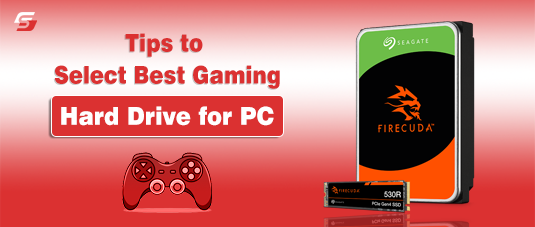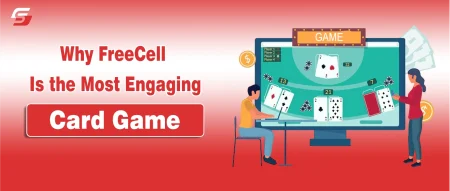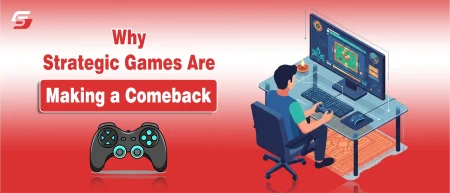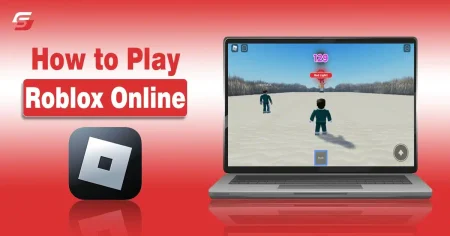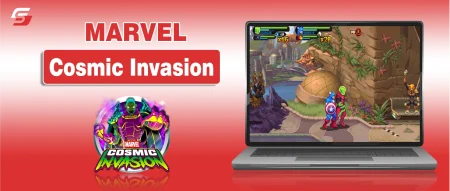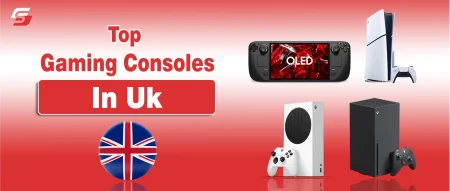When people think about gaming PCs, they usually talk about graphics cards, processors, and maybe even RAM. Yet, the hard drive often gets ignored, even though it plays a massive role in gaming performance.
A poorly chosen drive can drag your entire gaming setup down with long load times, laggy textures, and even corrupted saves. In this guide, I want to share the most important tips that will help you choose the best gaming hard drive for your PC.
Whether you are upgrading an existing build or starting fresh, these tips will help you make a choice you will not regret.
What is a Gaming Hard Drive?
A gaming hard drive is a storage device designed to handle the demanding requirements of modern video games.
Unlike a regular hard drive, a gaming-focused drive emphasizes speed, reliability, and sufficient capacity to store large game files, updates, and downloadable content. It plays a crucial role in reducing loading times, preventing stuttering during gameplay, and ensuring smoother overall performance.
Gaming hard drives can be traditional HDDs, faster SSDs, or advanced NVMe drives, depending on budget and performance needs. Essentially, it is the backbone of your game library, keeping your data safe while delivering quick access for an immersive experience.
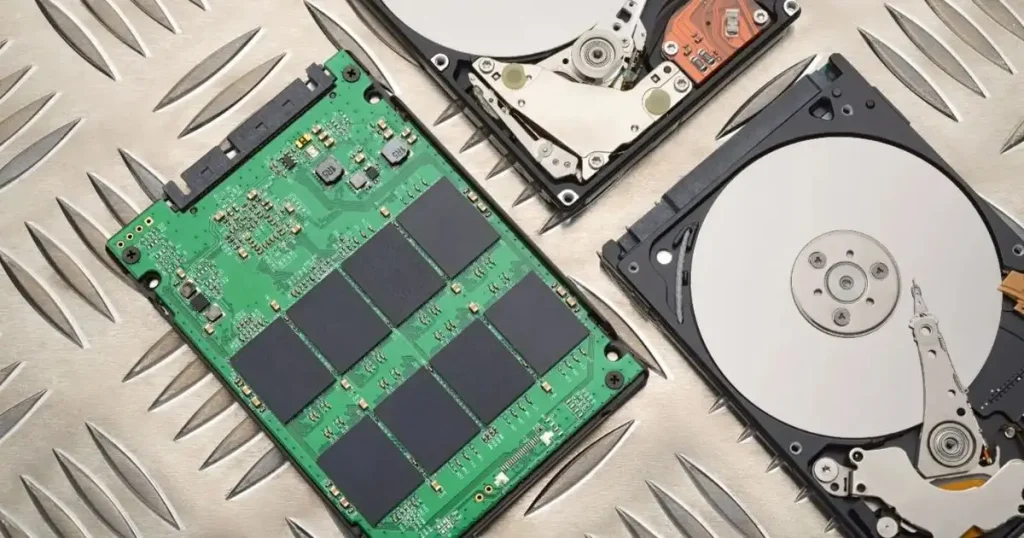
Tips to Select the Best Gaming Hard Drive for PC
In the under section, I have mentioned the top 10 tips that can help you select the best gaming hard drive for PC. You only have to consider your requirements and preferences to make the perfect purchase decision.
Tip 1 – Understand the Difference Between HDDs and SSDs
First, it is essential to understand the two main categories of hard drives: HDDs and SSDs.
- HDDs are traditional spinning-disk drives, which offer large storage capacities at low prices, and are perfect for gamers who collect massive libraries. However, they are slow, which means long load times in big games.
- SSDs, on the other hand, rely on flash memory and are much faster. You will notice quicker boot times, faster texture loading, and smoother gameplay in open-world environments. The downside is cost, as SSDs are more expensive per gigabyte.
Your choice ultimately depends on whether you value storage or speed more.
Tip 2 – Check the Storage Capacity You Really Need
Modern games are huge, often requiring 80 to 150 GB each, and updates add even more weight.
- If you play a few competitive titles like Valorant or CS:GO, a 512 GB SSD may be enough.
- But if you love AAA open-world games such as Cyberpunk 2077 or Red Dead Redemption 2, you should not settle for less than 1 TB.
Personally, I recommend planning ahead and considering at least 2 TB if your budget allows. It is better to have more space than you need rather than constantly uninstalling and reinstalling games, which can be frustrating and time-consuming.
Tip 3 – Consider the Read and Write Speeds
Hard drive speed directly impacts your gaming experience. Read speed determines how quickly games load assets, while write speed affects how fast data is saved, such as during autosaves.
- For HDDs, you should never go below 7200 RPM because anything slower will feel outdated.
- SSDs, especially SATA ones, usually deliver 500 MB/s speeds.
- NVMe SSDs can reach 3000 MB/s or higher.
I cannot stress enough how much difference this makes. An NVMe SSD can load a massive open-world map in seconds instead of minutes. Choosing the right speed tier is key if you want a smooth experience.
Tip 4 – Understand NVMe vs SATA SSDs
Not all SSDs are the same, and knowing the difference can save you from overpaying or underperforming.
- SATA SSDs are much faster than HDDs but are limited by the SATA interface, usually capping at 600 MB/s.
- NVMe SSDs, on the other hand, connect via PCIe and reach several gigabytes per second.
For gamers who want lightning-fast load times and instant responsiveness, NVMe is the gold standard. However, if you are on a tighter budget, a SATA SSD still delivers excellent performance compared to traditional drives.
I always suggest NVMe if your motherboard supports it, as it future-proofs your setup.
Tip 5 – Pay Attention to Reliability and Lifespan
Speed and storage are important, but reliability is just as critical. Imagine losing hundreds of saved hours because of a failed drive.
- HDDs are more prone to failure due to their moving parts, so choosing trusted brands with high MTBF ratings is crucial.
- SSDs are generally more durable but have a limited number of write cycles.
Look for drives with higher TBW ratings to ensure they last longer under heavy use. For gamers, it means investing in a reliable drive that can handle daily game installations, updates, and downloads without wearing out too quickly. Longevity matters more than price.
Tip 6 – Think About Hybrid Drives (SSHDs)
Sometimes, the best solution lies between the extremes of HDDs and SSDs.
Hybrid drives, or SSHDs, combine both worlds: they store frequently used files on a small SSD portion for speed while keeping less-accessed data on the larger HDD. It makes them faster than standard HDDs but more affordable than large SSDs.
I find them useful if you are balancing budget with performance. Still, they are not as fast as dedicated SSDs, especially NVMe ones. Gamers with mid-range builds or those who want storage for both games and media files, SSHDs can be a practical compromise.
Tip 7 – Don’t Ignore the Cache Memory
Cache memory is an often-overlooked feature but has a major impact on hard drive efficiency. It acts as a temporary high-speed storage buffer between your PC and the drive. Larger caches mean smoother performance, especially when dealing with large files or frequent read/write operations.
- For HDDs, a cache of at least 64 MB is recommended, while high-performance models may go up to 256 MB.
- For SSDs, caching is usually handled through advanced controllers and DRAM chips.
The bigger the cache, the faster your system can access frequently used game files, ultimately reducing stuttering and loading hiccups during gameplay.
Tip 8 – Evaluate Your Budget and Long-Term Needs
It is easy to be tempted by cheaper drives, but gaming is a long-term investment. Buying a small or slower drive might save money now but will likely force you to upgrade sooner.
I always advise balancing your budget between capacity and performance. Spending a little more upfront for a 1 TB or NVMe SSD can save you the hassle of upgrading within a year. Also, remember that games are only getting bigger with time.
Planning for future requirements ensures your drive remains useful for several years rather than becoming outdated too quickly. Think long-term, not short-term.
Tip 9 – Check for Compatibility with Your PC
Even the best hard drive is useless if your gaming PC cannot support it. Desktop users typically have the flexibility to install both SATA and NVMe drives, but it is important to check available slots on your motherboard.
Some may have only one M.2 slot for NVMe drives. Laptop users face even tighter restrictions, as many ultrabooks only accept NVMe SSDs due to limited space. Always confirm the physical size (2.5-inch for SATA or M.2 for NVMe) before purchasing.
Trust me, double-checking compatibility will save you from frustration and wasted money on a drive that does not fit your system.
Tip 10 – Consider Backup and Security Features
Gaming drives are not just about performance. They also protect your progress and data. Some drives come with built-in backup tools that can automatically save your files and guarantee you never lose progress of both, offline and online games, in case of failure.
Security is another factor to consider. Modern drives may offer hardware-based encryption, which keeps your data safe from unauthorized access. It is especially important if you store sensitive files alongside your games.
Investing in a drive with these features provides peace of mind, knowing that both your gaming experience and personal files are safe, even in the event of hardware failure.
Final Thoughts
These are the details about how to choose the gaming hard drive for PC.
Selecting the best gaming hard drive for your PC goes beyond just picking the cheapest option with the largest capacity. It requires understanding technology, anticipating future needs, and balancing speed, storage, and reliability.
I have seen too many gamers regret rushing into a purchase, only to face slow load times or data loss later. When you follow these 10 expert tips, you will not just get a drive that works but one that enhances your overall gaming experience.
Remember, a well-chosen hard drive ensures smoother gameplay today and keeps you ready for the ever-demanding games of tomorrow.




